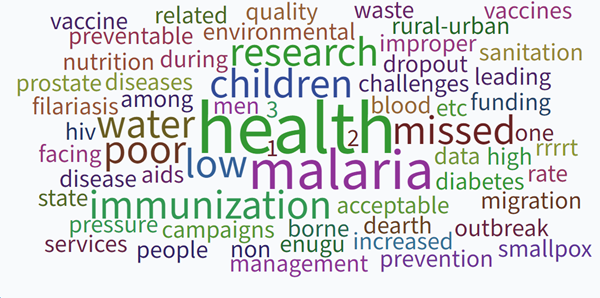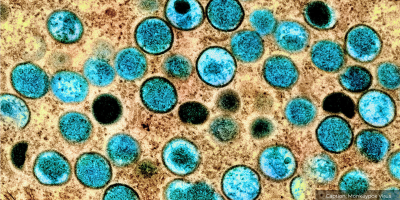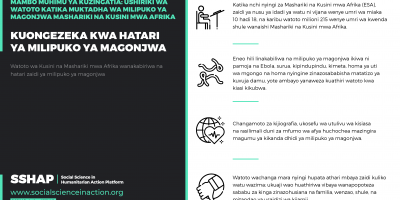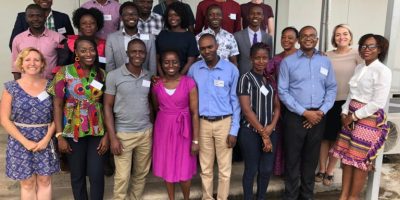Low uptake of healthcare services in rural communities in Enugu State, Nigeria, is a major challenge, especially during infectious disease outbreaks. There is an urgent need to better understand the context, and specific social, cultural, economic and other factors that influence care seeking in these communities, in order to improve healthcare service delivery as part of wider outbreak preparedness efforts.
In August 2023, the Enugu State Primary Health Care Development Agency (PHCDA) commissioned the Social Science in Humanitarian Action Platform (SSHAP) to run a workshop for PHCDA and Enugu State Ministry of Health staff to help strengthen the organisations’ qualitative research capacity to improve preparedness for outbreaks.
About Social Science in Action workshops
SSHAP’s Social Science in Action workshops (SSAW) practical technical assistance workstream responds to capacity gaps identified through an open call for applications from organisations around the world. Applicants outline a specific challenge they face in integrating social science evidence into their emergency preparedness and response efforts. SSHAP then works with the commissioning partners to design a workshop that can help them overcome or mitigate that challenge. The workshops are structured around a certain issue or problem, tailored to an individual organisation’s specific requirements, using existing tools or data.
Enugu State workshop
The SSAW in Enugu State was designed to address the following objectives:
- To understand the current context and key outbreak preparedness challenges in Enugu State.
- To provide an overview of selected rapid social science research approaches and methods and discuss case study examples of previous outbreaks in the region.
- To plan for the application and use of social science evidence by PHDA in outbreak preparedness.
Participants raised multiple socially rooted factors influencing health outcomes in Enugu State, such as poverty, education, sanitation, migration, etc, (see the word cloud above). Similarly, there was awareness about the importance and role of social sciences in informing public health emergency response even if it was not used to a similar extent in actual practice.
Over the course of the workshop, participants shaped plans for applying social science methods to begin answering critical questions that they face in their work. These questions included:
- What are the risk factors or causes of delayed reporting and late presentation of Lassa Fever cases to the health facility? Who should be involved in community engagement activities?
- How can data collection at facility and Local Government Authority (LGA) levels be enhanced to improve childhood immunization?
Participants were supported to incorporate a range of social science methods and associated activities in their plans, including the use of focus group discussions and key informant interviews; the conducting of needs and assets assessments; and the training of LGA and facility staff to collect data.
Participants’ experiences
SSHAP actively seeks to learn from experiences of co-designing and delivering SSAW processes, including challenges faced by SSHAP team members and participants; what could be improved for the future; and what could be done differently.
A follow-up survey of Enugu State SSAW participants results in 94% of respondents agreeing or strongly agreeing that SSHAP added value and/ or strengthened competencies to generate and apply social science evidence in the participants’ practices:
“In cultural factor(s) that lead to unhealthy behaviour like in immunization, some believe that it reduces fertility in men and women but (I) believe (that) with the application of SSHAP program implementation there are positive results in uptake of immunization”
“(SSHAP has added value in) understanding community perspective(s) and behaviours for effective communication strategies and addressing vaccine hesitancy. (As well as) collaboration and engagement with stakeholders from various sectors.”
100% of respondents agreed that the workshop has helped them to better understand how they can integrate social science in their work:
“(I) Have deeper understanding on how to discuss and penetrate the society on way(s) forward for their health promotion without criticizing their belief.”
“How to gain behavioural insight into factors influencing vaccination decisions at the individual and community levels”
Following the workshop, 100% of respondents said they applied the insights and skills gained from the workshop in their humanitarian work:
“With deeper understanding of SSHAP (I) was able to carry out effectively the proper approach (…) of malaria control in pregnancy and under 5-children during (a) malaria sensitization campaign”
“As I go out for NTDs trainings in LGAs, I now encourage the participants to change their attitude towards relationship with others as (they) believe that LF (Lymphatic filariasis) is caused by neighbours rather than mosquito(s)”
79% of respondents agreed that the SSHAP workshop helped them to overcome challenges in their work:
“Non-compliance to immunization has been reduced”
“Having in mind how to tackle their health issues and way forward without interfering in their beliefs, but passing the right message with simplicity”
100% of respondents were very satisfied or satisfied with the SSHAP workshop overall.
SSHAP learning
From the SSHAP team’s perspective, a key challenge when designing the workshop was how to correspond with the expectations of participants, with difference between senior staff who are more likely to commission social science research to inform decision making, and practitioners with a strong interest in designing, implementing and integrating social science research into their work. The experience reinforced the value of in-depth preparation with those commissioning this form of technical assistance and those who will participate.
One other widely familiar challenge was the hybrid nature of the workshop. Participants were in multiple locations, and because of prohibitive travel costs and security issues, the facilitation team was unable to travel to Enugu state. This required some experimentation and adaptation during the workshop to work out the best available solution to enable an interactive format, which was appreciated by participants. Continued mentorship and collaboration were also cited by participants as key forms of support for the future.
SSHAP launched the SSAW workstream during its first phase in response to operational partners’ requests for capacity building. SSHAP will be delivering several more commissioned SSAW activities during 2024.






